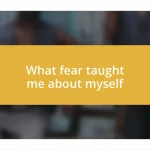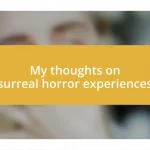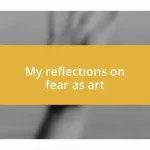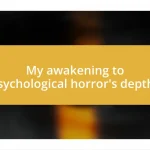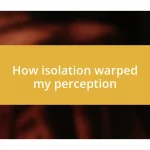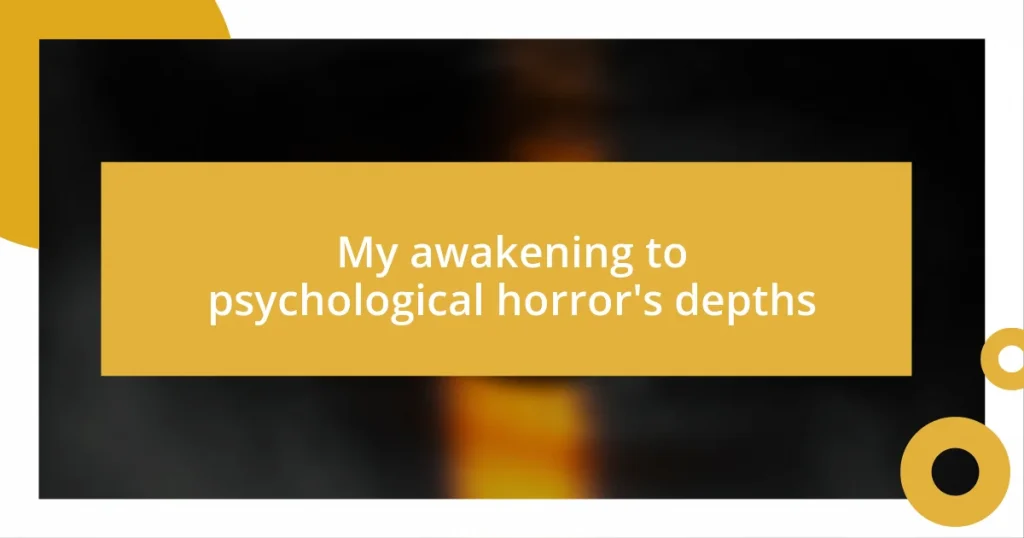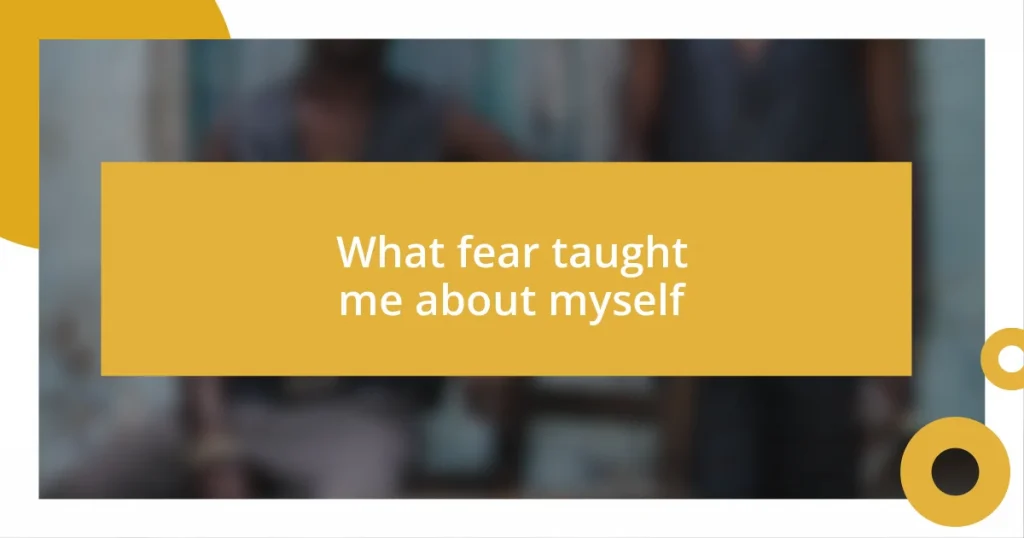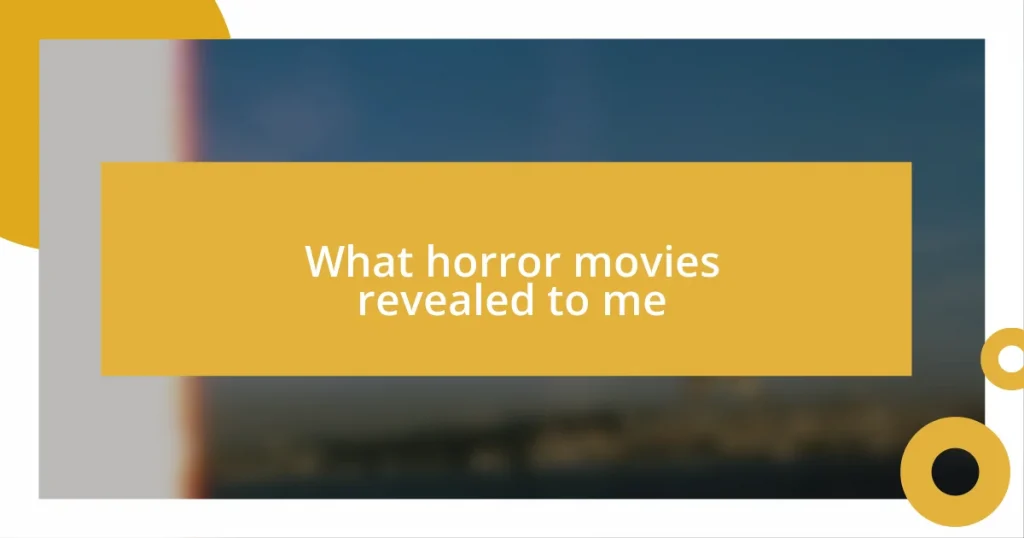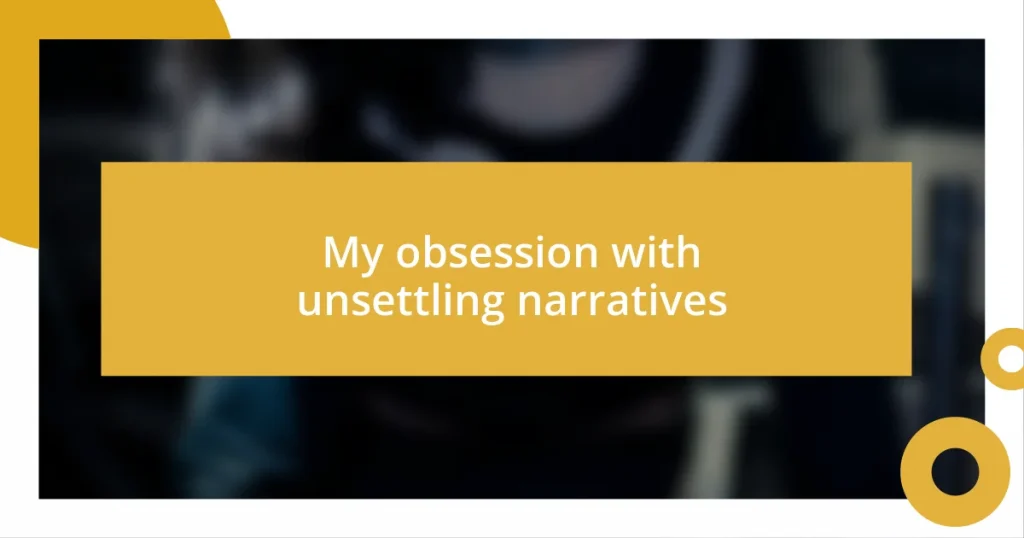Key takeaways:
- The core themes of psychological horror include isolation, madness, and the distortion of reality, which evoke relatable fears and vulnerabilities in the audience.
- Key elements such as mental manipulation, gradual tension buildup, and complex character development enhance the horror experience, allowing viewers to empathize with characters’ struggles.
- Techniques like creating atmospheric uncertainty, manipulating perspectives, and showcasing moral ambiguity deepen psychological terror, compelling audiences to confront their own fears and insecurities.
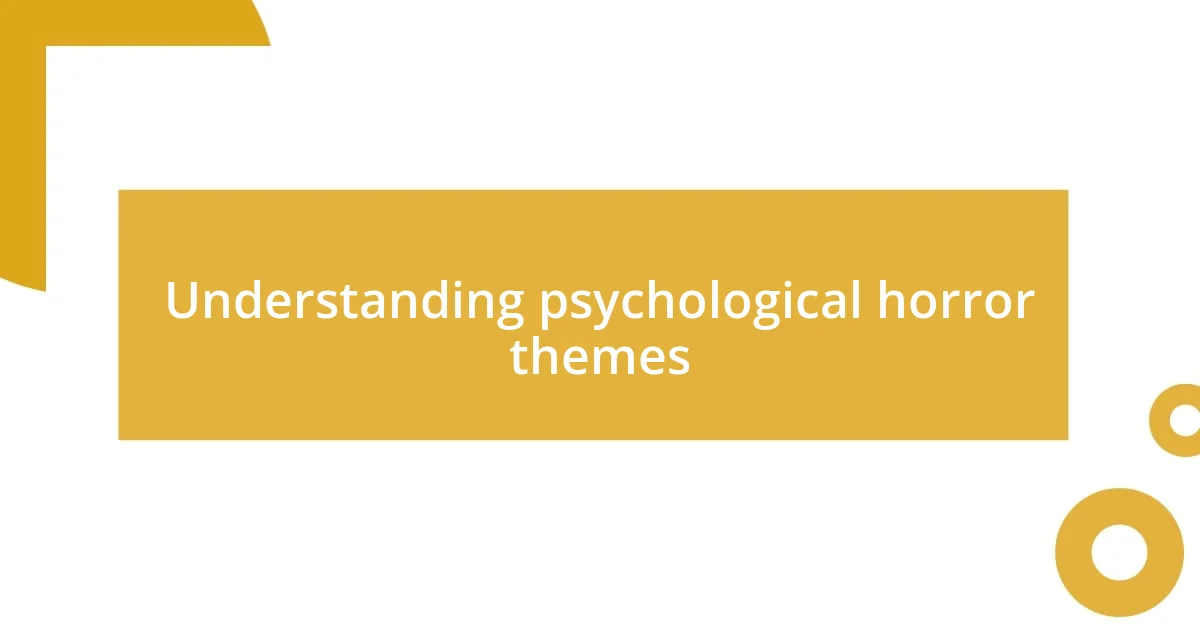
Understanding psychological horror themes
Psychological horror thrives on the mind’s fragility, where fear takes root in uncertainty and the unknown. I remember watching a film that left me unsettled—not because of graphic scenes, but due to the insidious way it suggested that reality could unravel. Isn’t it fascinating how our own thoughts can become our biggest nightmares?
Themes like isolation, madness, and the distortion of reality are common in psychological horror. I once encountered a story where the protagonist slowly descended into paranoia, making me question my own perceptions of trust and safety. It made me wonder, how often do our minds play tricks on us, bending the truth just enough to disturb our peace?
At its core, psychological horror delves into the human psyche, exposing vulnerabilities we often hide. I often find myself reflecting on how the fear of our deepest fears, like mortality or loneliness, can manifest in hauntingly relatable ways. Have you ever felt that shiver down your spine when something familiar suddenly feels unsettlingly wrong? It’s in those moments that psychological horror resonates most deeply with us.
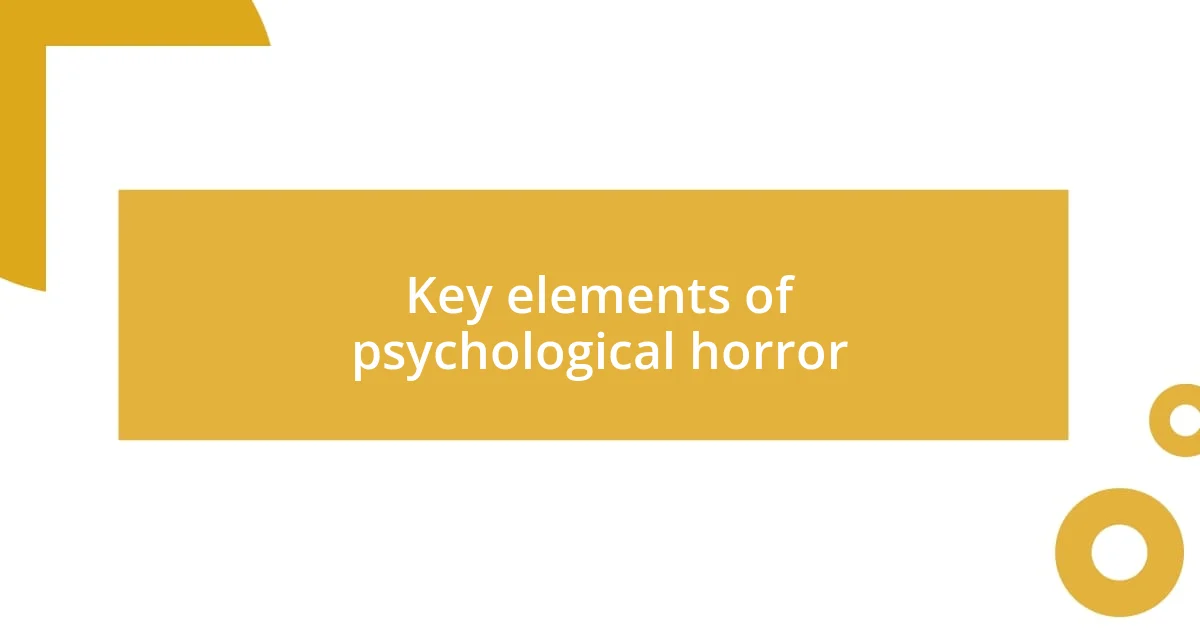
Key elements of psychological horror
Psychological horror often exploits the intricacies of the human mind, weaving fear from our own irrational thoughts. I recall a time when I was engrossed in a book that played with the concept of memories—how they can be unreliable and manipulated. The more I read, the more I questioned my own recollections, realizing how easily our minds can construct alternate realities.
One of the standout features of psychological horror is the gradual buildup of tension, where dread looms larger as the story unfolds. I distinctly remember watching a movie that unfolded its terror slowly, the mounting suspense felt almost unbearable. Each scene layered unease upon another, emphasizing how anticipation can often be scarier than the horror itself.
Lastly, character development is crucial in psychological horror as it shapes how we perceive the unfolding events. Engaging with complex characters allows us to experience their turmoil, making their fears our own. I found myself empathizing with a character who faced constant anxiety, reflecting on how fear can immobilize us in real life. It’s a powerful reminder that sometimes the most terrifying horrors are not those we see, but those we feel.
| Key Elements | Description |
|---|---|
| Mental Manipulation | Explores the fragility of memory and reality, leading to self-doubt. |
| Gradual Building of Tension | Creates horror through suspense rather than overt scares. |
| Complex Character Development | Allows readers/viewers to empathize with fears and anxieties. |
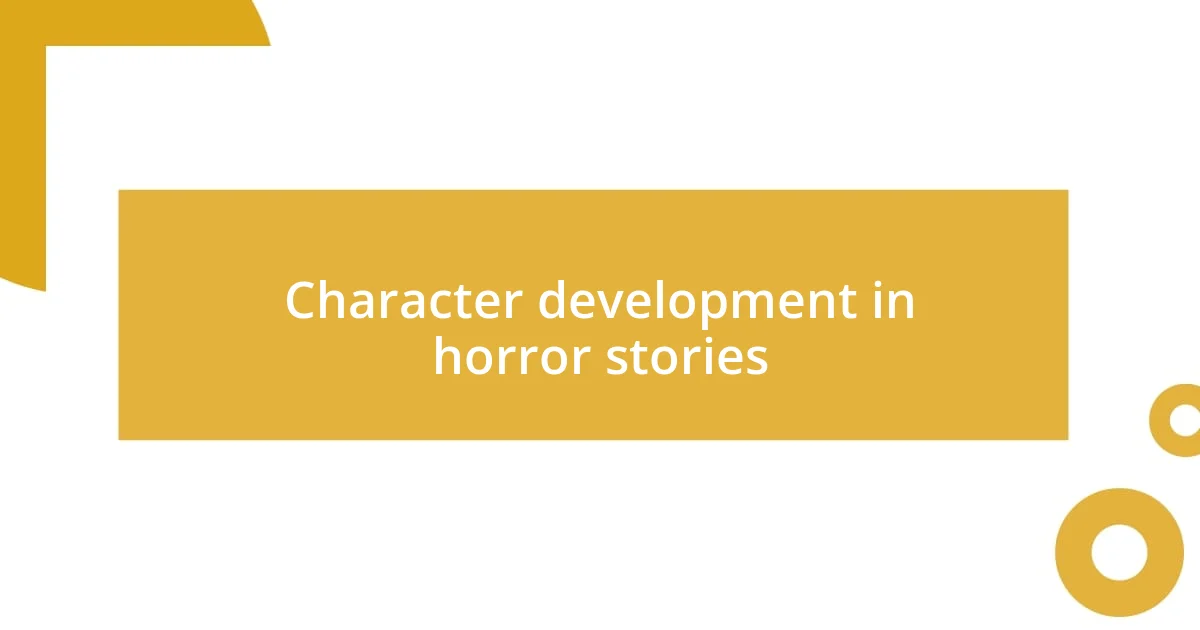
Character development in horror stories
Character development serves as the backbone of horror narratives, allowing us to connect with the characters on a deeper level. I remember a chilling tale where the protagonist’s descent into madness was palpable. As her grip on reality slipped, I felt an unsettling empathy. Her struggles mirrored my own fears, reminding me that vulnerability is something we all share, even in the darkest moments.
- Characters often start in a relatable state, which amplifies the horror when their transformation occurs.
- The journey of a character often reflects our human experience with fear, anger, and sadness, making the horror feel more personal.
- We can witness how isolation or trauma can stretch someone beyond their limits, evoking our own dormant fears.
- Strong character arcs help ground the surreal elements of horror, making them feel eerily plausible.
In a different piece, I encountered a character whose overwhelming guilt transformed him into a specter of his former self. As I watched him spiral into despair, it struck me—his internal torment was a reminder of our own unresolved issues. This kind of character development doesn’t just serve the plot; it evokes raw emotions that linger long after the story ends. The true horror sits not only in what happens to the characters, but in how effortlessly we can see elements of ourselves reflected in their struggles.
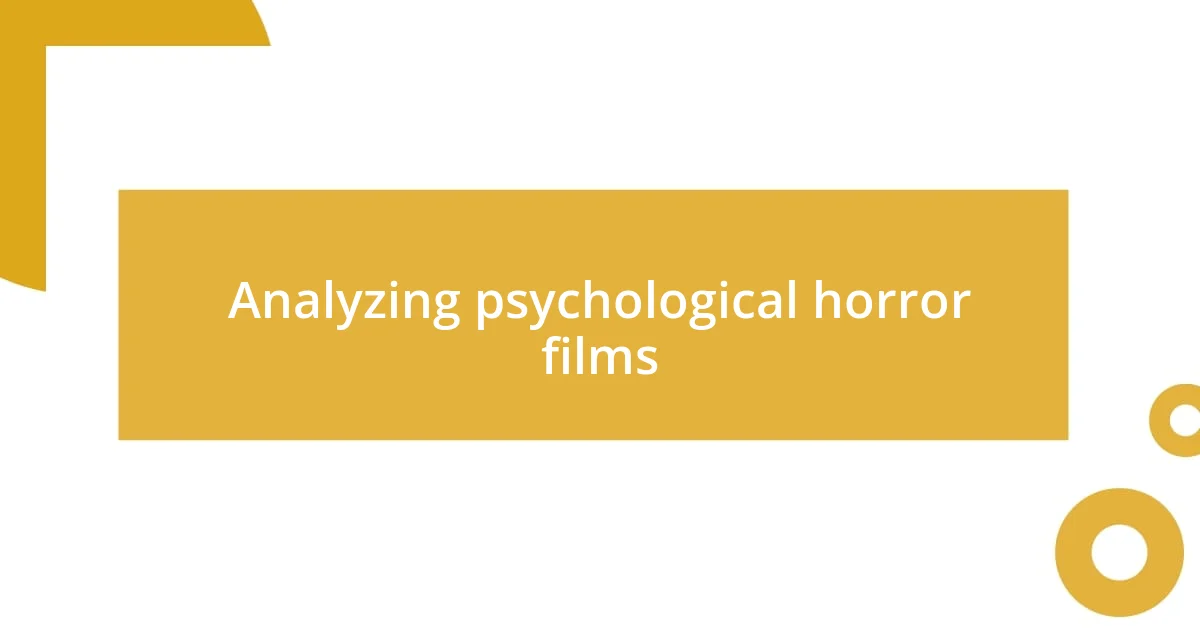
Analyzing psychological horror films
Let’s dive deeper into the realm of psychological horror films. When I reflect on some of the most impactful examples, I notice how they often use ambiguity to keep us off balance. One film that left a lasting impression on me was built on a twisty narrative that kept me questioning what was real. I remember sitting on the edge of my seat, feeling my heart race as I tried to decipher the clues laid out before me. It makes me wonder—how do these films tap into our innate desire for resolution while simultaneously leaving us in a state of unease?
Another aspect that fascinates me is the atmosphere these films create. It’s not just the visuals or eerie music; it’s the subtle details that haunt long after the credits roll. I recall watching a movie where shadows played tricks on the mind, making ordinary settings feel sinister. Isn’t it intriguing how something as simple as a flickering light can evoke a sense of impending doom? This mastery at crafting a chilling ambiance invites us to confront our deepest fears, often reflecting our own insecurities back at us.
Complex character arcs further immerse us in psychological horror. I encountered a protagonist grappling with a dark secret, their inner turmoil expertly portrayed. Watching their descent into madness felt personal—did I not have my own shadows lurking beneath? This connection humanizes the horror, reminding us that the scariest monsters are often those we nurture within. It’s this blend of character depth and psychological exploration that leaves an indelible mark, engaging us in a journey through the labyrinth of our own minds.
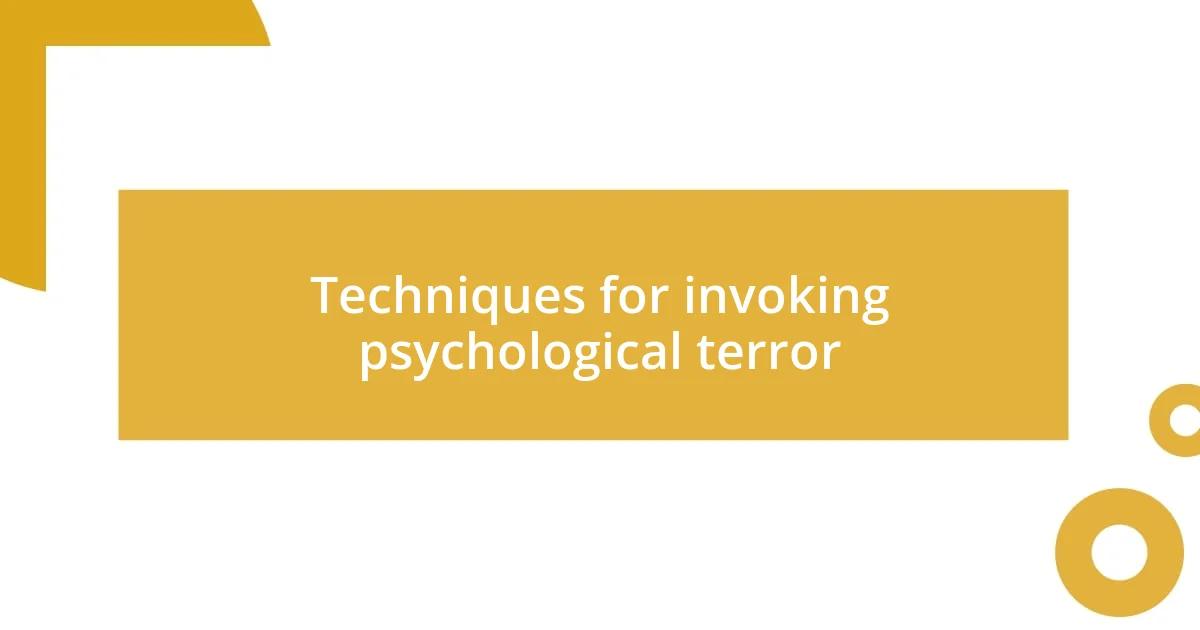
Techniques for invoking psychological terror
Often, the most effective techniques for invoking psychological terror lie in creating an atmosphere of uncertainty. I remember reading a story where the main character unknowingly crossed paths with a lurking danger, masked by the mundane. This made me realize how fear often stems not from what’s seen, but from what’s left unspoken. Isn’t it fascinating how our imagination can build entire narratives around silence and suggestion? The power of the unknown pulls us in, tightening its grip as we question what lurks just beyond the shadows.
Another compelling method is manipulating the audience’s perspective. I once watched a film where the camera focused on mundane tasks, yet the soundtrack resonated with dread. It forced me to confront my own anxieties as I began to question the safety of my surroundings. By intertwining the ordinary with a sense of impending doom, creators leave us teetering on the edge of reality. How often do we question our sanity when faced with inexplicable instances? It’s this fusion of the familiar with the terrifying that stirs a discomfort deep within us, making the experience unforgettable.
Lastly, employing moral ambiguity can elevate psychological terror to new heights. I recall a novel where the protagonist’s decisions wouldn’t just affect them, but unraveled the lives of those around them. It made me reflect: how far would I go to protect my own interests? When characters face moral dilemmas, the tension intensifies as we are forced to examine our values and fears. This aspect of horror doesn’t just frighten; it resonates on a profound, personal level, turning the experience into a haunting mirror of our own choices and their consequences.
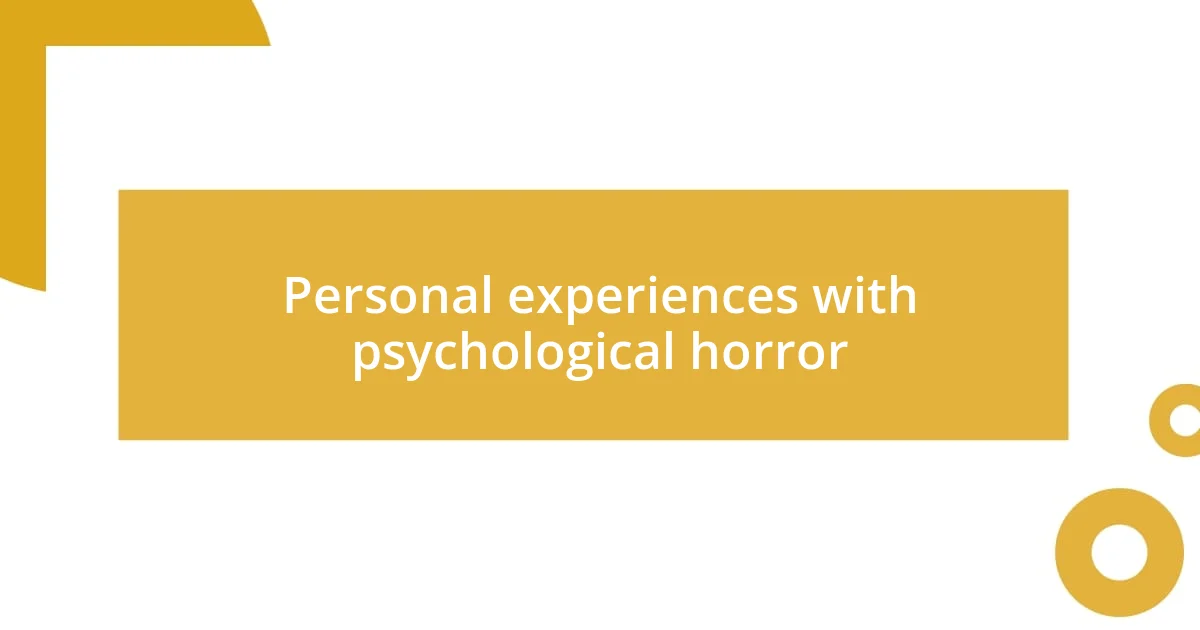
Personal experiences with psychological horror
I often find myself reflecting on a time when I stumbled upon a psychological thriller that crawled under my skin. The protagonist’s obsessive thoughts mirrored my own insecurities, forcing me to confront feelings I’d buried for years. Have you ever felt a character’s mental battles resonate so deeply with you that it felt like a reflection of your own struggles? It’s an unsettling connection that lingers long after the story ends.
One of the most chilling experiences I had was during a late-night screening of a psychological horror film. The plot twisted until I felt convinced the walls were closing in on me. The film challenged the boundaries of sanity, causing me to second-guess my perceptions. I remember leaving the theater, my heart pounding and mind racing. Has anyone else experienced that sense of paranoia that seeps into reality, blurring the lines between fiction and truth?
In another instance, I found myself completely immersed in a book whose psychological tension built slowly, like a coiled spring ready to snap. Each turned page revealed more about the characters’ fractured minds. It was like peeling back the layers of my own psyche, exploring my reactions to their dilemmas. How liberating yet terrifying is it to uncover the facets of ourselves that we often hide? This deep emotional dive reminds us that psychological horror goes beyond fear; it explores the complexities of human existence itself.
